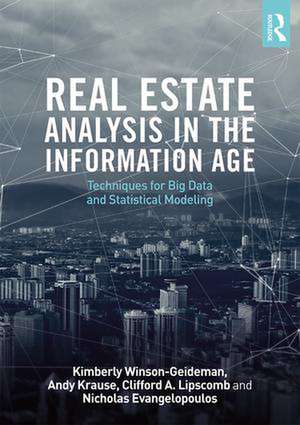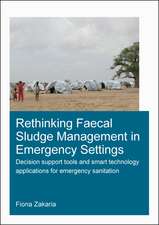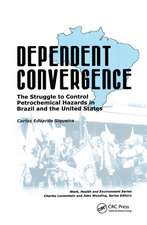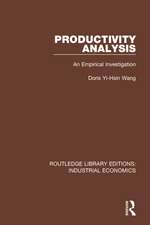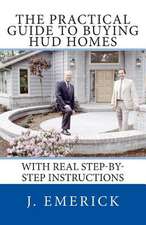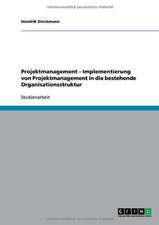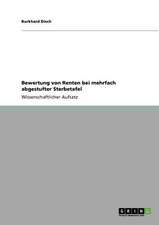Real Estate Analysis in the Information Age: Techniques for Big Data and Statistical Modeling
Autor Kimberly Winson-Geideman, Andy Krause, Clifford A. Lipscomb, Nick Evangelopoulosen Limba Engleză Paperback – 9 noi 2017
| Toate formatele și edițiile | Preț | Express |
|---|---|---|
| Paperback (1) | 535.62 lei 6-8 săpt. | |
| CRC Press – 9 noi 2017 | 535.62 lei 6-8 săpt. | |
| Hardback (1) | 931.61 lei 6-8 săpt. | |
| CRC Press – 14 noi 2017 | 931.61 lei 6-8 săpt. |
Preț: 535.62 lei
Preț vechi: 630.14 lei
-15% Nou
Puncte Express: 803
Preț estimativ în valută:
102.52€ • 111.40$ • 86.18£
102.52€ • 111.40$ • 86.18£
Carte tipărită la comandă
Livrare economică 21 aprilie-05 mai
Preluare comenzi: 021 569.72.76
Specificații
ISBN-13: 9781138232907
ISBN-10: 1138232904
Pagini: 180
Ilustrații: 28 Line drawings, black and white; 26 Tables, black and white
Dimensiuni: 174 x 246 x 13 mm
Greutate: 0.33 kg
Ediția:1
Editura: CRC Press
Colecția Routledge
ISBN-10: 1138232904
Pagini: 180
Ilustrații: 28 Line drawings, black and white; 26 Tables, black and white
Dimensiuni: 174 x 246 x 13 mm
Greutate: 0.33 kg
Ediția:1
Editura: CRC Press
Colecția Routledge
Public țintă
Academic, Professional, and Professional Practice & DevelopmentCuprins
Introduction
Section 1 Concepts
Chapter 1 Traditional Real Estate Data – the what, where, when and how
Chapter 2 Big Data
Section 2 Data management and related issues
Chapter 3 Managing real estate data
Chapter 4 Cleaning real estate data
Chapter 5 Building a transparent and repeatable workflow
Chapter 6 The process of gathering ‘Big’ real estate data
Section 3 Modeling and Analysis
Chapter 7 Software tools for real estate analysis
Chapter 8 Mapping and exploratory data analysis
Chapter 9 Analyzing spatio-temporal changes in properties
Chapter 10 Statistical techniques to identify data error and outliers
Chapter 11 Pricing models
Chapter 12 Analysis of unstructured text
Section 4 Concluding remarks
Chapter 13 The legalities of Big Data
Chapter 14 The future of Big Data
APPENDICES Two case studies
Case Study 1: residential property valuation
Case Study 2: analysis of social media content
Section 1 Concepts
Chapter 1 Traditional Real Estate Data – the what, where, when and how
Chapter 2 Big Data
Section 2 Data management and related issues
Chapter 3 Managing real estate data
Chapter 4 Cleaning real estate data
Chapter 5 Building a transparent and repeatable workflow
Chapter 6 The process of gathering ‘Big’ real estate data
Section 3 Modeling and Analysis
Chapter 7 Software tools for real estate analysis
Chapter 8 Mapping and exploratory data analysis
Chapter 9 Analyzing spatio-temporal changes in properties
Chapter 10 Statistical techniques to identify data error and outliers
Chapter 11 Pricing models
Chapter 12 Analysis of unstructured text
Section 4 Concluding remarks
Chapter 13 The legalities of Big Data
Chapter 14 The future of Big Data
APPENDICES Two case studies
Case Study 1: residential property valuation
Case Study 2: analysis of social media content
Descriere
The creation, accumulation, and use of copious amounts of data are driving rapid change across a wide variety of industries and academic disciplines. This ‘Big Data’ phenomenon is the result of recent developments in computational technology and improved data gathering techniques that have led to substantial innovation in the collection, storage, management, and analysis of data.Real Estate Analysis in the Information Age: Techniques for Big Data and Statistical Modeling focuses on the real estate discipline, guiding researchers and practitioners alike on the use of data-centric methods and analysis from applied and theoretical perspectives. In it, the authors detail the integration of Big Data into conventional real estate research and analysis. The book is process-oriented, not only describing Big Data and associated methods, but also showing the reader how to use these methods through case studies supported by supplemental online material. The running theme is the construction of efficient, transparent, and reproducible research through the systematic organization and application of data, both traditional and 'big'. The final chapters investigate legal issues, particularly related to those data that are publicly available, and conclude by speculating on the future of Big Data in real estate.
